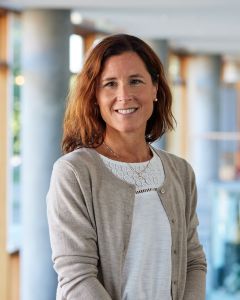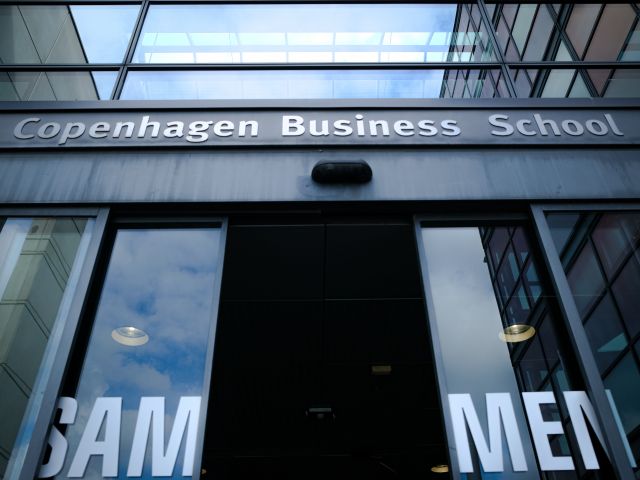SOL saved as an MSc EBA programme

Photo: Anna Holte
On Thursday 15 December, the final decision arrived about the new MSc EBA (cand.merc.) programmes – with one significant change: the concentration SOL (Strategy, Organisation and Leadership) will remain on board and continue as an MSc EBA programme from 2024.
Senior Management arrived at this conclusion after a one-month extended hearing process, which was launched following a heated debate, much concern across CBS and many questions from numerous stakeholders among students and faculty, not least during the online Teams Hall Meeting.
The recent month has seen many documents from various fora, meetings and consultations between primarily the new Dean of Education Anna Thomasson and numerous stakeholders from faculty and students.
The original proposal from the MSc EBA (cand.merc.) study board had nine concentrations survive (to be turned into fully-fledged programmes), then Senior Management’s preliminary decision upped the ante to include the tenth – the concentration Applied Economics and Finance (AEF).
In addition, it has been decided to incorporate the AEF concentration in the MSc in Advanced Economics and Finance (cand.oecon.).
Thus, three concentrations are closing: From 2024, Brand and Communications Management (BCM), International Business (IBS) and International Marketing and Management (IMM) will not be continuing as MSc programmes.
Why SOL was saved: Organisation is a core discipline
Originally, the Study Board used the following arguments for losing SOL:
- Not enough employer and student demand for three programmes within the Organisation domain.
- People and Business Development (PBD) and Management of Innovation and Business Development (MIB) have the strongest connection to the subthemes of People and Innovation.
- SOL is not strongly linked to the fields of Economics and Business Administration.
- SOL lacks a well-defined orientation towards business functions.
- Strategy and leadership are already core elements of the new cand.merc (GMA).
The reply from the Department of Organization (IOA) based on two staff meetings argued for the continuation of SOL, stating that:
- SOL is crucial for the key business domain of Organisation (as reflected in the so-called domain model used by the Study Board) in the cand.merc. EBA portfolio especially since SOL is “the only concentration with a designated focus on advanced organization studies”.
- Closing SOL would be “most likely to have a detrimental effect on the talent pipeline” in organisation and leadership studies.
- SOL links directly to the CBS strategy on leadership and closely aligns with CBS’ overall transformative strategy, providing candidates with critical analytical skills, a natural fit with the Nordic Nine aspirations.
- SOL has high “brand value”, documented in the background material and high employability numbers, with employers actively seeking candidates with this degree. The department conducted its own LinkedIn analysis of first jobs after 2020 graduation, which showed a “strong flow to positions in private companies, 31% to consulting firms”.
- If SOL closed, recruitment of international faculty in this area will be difficult.
- Gender balance in the MSc EBA portfolio: closing SOL (with its near-equal gender representation) will skew it towards male dominance.

Dean of Education Anna Thomasson. Photo: CBS
Senior Management has heeded the call to keep SOL on board as the MSc EBA flagship. In the Share intranet announcement, Dean of Education Anna Thomasson says:
“We have become more settled in our discussions with the organisation. Organisation is a discipline within business administration and a central business economics subject. This is also seen at those universities CBS compares itself with. Also, leadership is one of CBS’ strategic initiatives. Therefore, we believe that CBS should have an MSc EBA programme in these areas. And that is why we have chosen to establish Strategy, Organisation and Leadership as an MSc EBA programme.”
And to CBS WIRE, she elaborates:
“After looking more deeply into the matter, it was clear that the organisation domain and its content were too narrowly defined. Senior Management sees organisation as a core discipline and a natural part of the MSc EBAs portfolio. Without SOL, we would lose very important disciplines like leadership, strategy and also organisational change and change management.
“We benchmarked with other business schools and clearly these disciplines are represented. We want to give them to our students, and employers are asking for ths. But it’s not just employment – overall the MSc EBA concentrations have good figures. In this case, it is more of an assessment based on disciplines, focused on what a business education is and what should be at its core.”





































































































































Comments